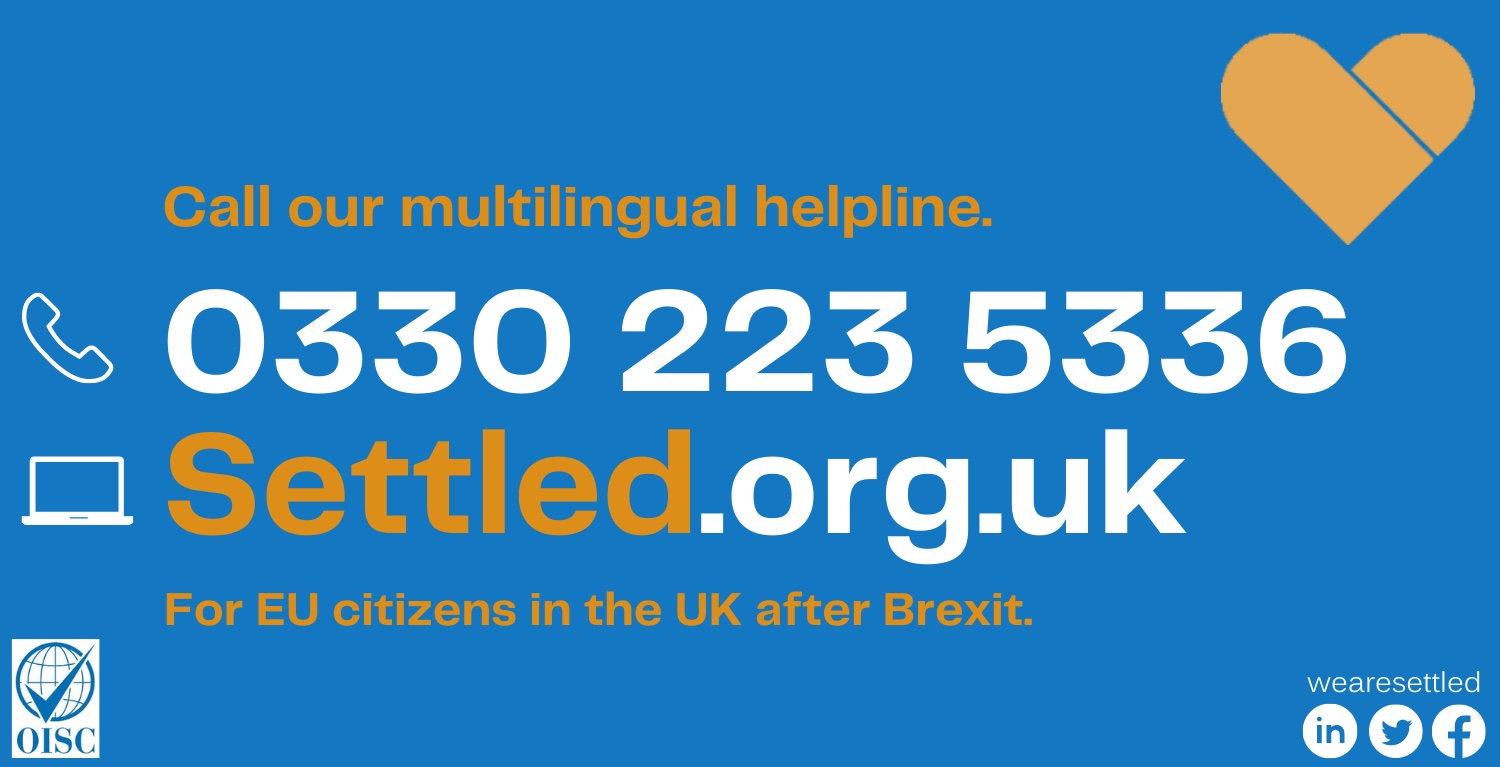EU citizens in the UK: how to make a late application to the EU Settlement Scheme
Jana has worked in the UK since 2007. Like many other EU citizens, she obtained permanent residence under EU rules, in 2018. That led her to believe that her rights after Brexit were secured. Only in 2022 she realised she needed a new residence status. What to do in such cases? Settled, a charity offering free advice, explains.
When the EU Settlement Scheme (EUSS), the system recognising the post-Brexit rights of EU citizens, opened in 2019, Jana did not apply. “I had permanent residence and I believed settled status wasn’t for me. I thought I was fine to stay,” she says.
In 2022 she realised she needed to apply. The deadline – 30 June 2021 – had passed, but the scheme is still open if applicants can explain there is ‘reasonable ground’ for the delay.
At that time, however, Jana was also dealing with other problems, a divorce, a car accident, changing job and home, and “my husband taking stuff from my home in Slovakia”.
In haste, Jana applied for settled status on the government website explaining her situation in few sentences. Her request was quickly rejected as invalid, as she didn’t provide the reasons for being late. She describes divorcing as “mentally exhausting”, which left her unable to complete the application with lengthy details.
Seeking help, Jans contacted Settled, a charity offering free advice on the EU Settlement Scheme, and with their support she obtained settled status on 31 January 2024.
Similar cases have been reported in the media in the past months and many other EU citizens need to make late applications to the post-Brexit residence scheme. Support groups urge eligible persons who have not done so yet to apply for settled status as soon as possible. But when are late applications accepted and what do applicants need to back their case? Settled explains.
What are the rules for late applications?
EU citizens who were living in the UK before 31 December 2020 have to apply to the EU Settlement Scheme to confirm their right to live, work and study in the country. It is still possible to apply but there must be valid reasons – ‘reasonable grounds’ – for not having met the 2021 deadline.
Initially, the Home Office did not insist on providing evidence. However, that changed with new rules that came into effect on 9 August 2023, which make late applications more demanding.
What has changed since August 2023?
One change is that the Home Office now considers the reasons for the delay before looking at the merit of the application. If the reasons are accepted, a Certificate of Application is issued. If not, the application is rejected as invalid.
Secondly, a number of situations that the Home Office considered valid reasons for being late are no longer accepted.
What are ‘reasonable grounds’ for the delay?
Due to such rule changes, a number of EU citizens were ordered to leave the country because they could not fulfil the late applications criteria, despite having lived in the UK for decades and having British families.
In January 2024 the Home Office therefore expanded again the list of ‘reasonable grounds’, which now include these situations:
- a child under the age of 18 at the time of the deadline, for whom a parent, guardian or local authority has failed to apply
- lacking physical or mental capacity to apply
- a medical condition which prevented applying
- being victim or survivor of an abusive or controlling relationship
- being a victim of modern slavery
- imprisonment at the time of the deadline
- having arrived in the UK on a work or study visa and having become eligible to apply to the EU Settlement Scheme (for instance by marrying an EU citizen) without knowing
- having already acquired the right to stay (indefinite leave to enter or remain) and not knowing eligibility for the scheme
- having had permanent residence status under EU rules or a residence document (such as a registration certificate) that stopped being valid after 30 June 2021 and not knowing the need to apply for settled status, with valid reasons
- having a limited right to stay (leave to enter or remain) under another immigration scheme, or being a child or applying for a child, and not having been aware of the obligation to apply
- another compelling practical or compassionate reason that prevented the application.
Reasons that are no longer considered acceptable include:
- not knowing the settled status and the need to apply
- having overlooked the deadline
- having limited English language skills
- being unable to access internet
- other reasons associated with the pandemic.
Is there a right to appeal?
Another major change to the rules that took effect in October 2023 is that if the reasons for the late application are not considered reasonable and the Home Office rejects it as invalid, there will be no right to an appeal or administrative review. The only possible remedy will be a judicial review.
Legal charity Here for Good is currently fundraising to take forward a legal action to guarantee the right of appeal for invalid late applications. With partners, the group also prepared a template ‘pre-action protocol’ to challenge invalidity rejections. The information are available here.
On the other hand, if the Home Office accepts the reason for the delay but the application is then refused on merit, the applicant has the right to appeal or to submit another application.
What are the consequences of not having valid status?
EU citizens without a valid status under the EU Settlement Scheme who continue to reside in the UK risk encountering significant legal and practical difficulties.
On a legal level, they may receive a notice to leave the UK, which could lead to removal from the country. Failure to comply with this notice can result in detention while arrangements for removal are made.
On a practical level, the lack of legal status can affect access to healthcare, employment and housing. Individuals may find it difficult to rent a home, open a bank account or secure employment without proof of their right to reside in the UK. They may also be requested to pay for public healthcare, be denied benefits, or be rejected at the border after travelling abroad.
In addition, living without legal status can lead to social isolation and economic hardship. In essence, it can prevent individuals from fully participating in society.
Citizens’ rights groups advice anyone without valid status to seek legal advice and apply for regularization immediately to avoid these potential repercussions.
How to submit a late application?
The documents required to apply to the EU Settlement Scheme include:
- Proof of identity
- Proof that continuous residence in the UK started before 31 December 2020, unless the application is made by a family member joining an EU citizen with settled status
- If applying to join a family member, proof that the relationship and their eligibility existed before 31 December 2020
,except for children born later - Evidence that explains why the deadline was not met as specified above.
Individuals with a valid EU biometric ID or UK Biometric Residence Card can start the application from smartphones’ EU EXIT:ID Document Check App. In all other cases applications can be submitted online.
The application to the EU Settlement Scheme is free. However, there might be additional fees for translations, biometric appointments, scanning centres or, if needed, professional legal advice.
Further information is available on the Settled website.
This article is prepared in collaboration with Settled, a UK-wide charity accredited by the Office of the Immigration Services Commissioner (OISC) which offers free advice on the EU Settlement Scheme in several European languages. Settled advisors can be reached on 0330 223 5336 or via email (in the preferred language) at advice@settled.org.uk, roma.advice@settled.org.uk for Roma people, or ApplyEUSSWales@settled.org.uk for people in Wales.

Image by Mathew Browne from Pixabay




